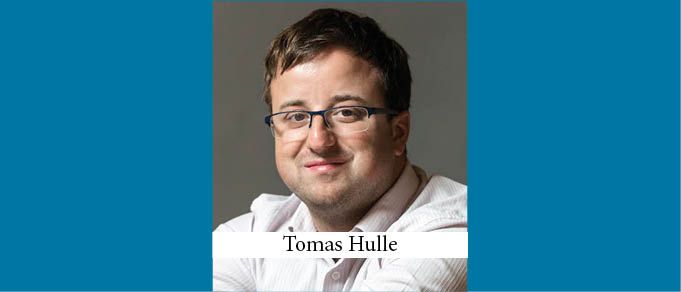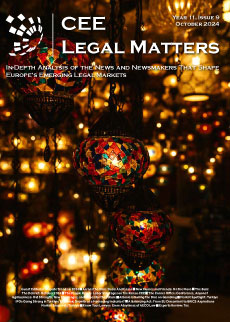The Prague-based European Centre for Career Education focuses on providing students a practical and complimentary education, focusing on kinds of practical experience and inspiration they rarely receive in their university studies. After they complete the program, ECCE helps participants obtain useful internships with companies such as Siemens, Unicredit, Exxon Mobile, T-Mobile, and Lego, and with law firms including DLA Piper, Clifford Chance, Allen & Overy, and Dentons.
The ECCE is the brainchild of Tomas Hulle, himself a Czech lawyer with many years of experience working both for regional and international law firms such as Schoenherr and Lovells (now Hogan Lovells) and at publications like the Czech Republic’s Economic Daily and The Economist.
We reached out to Tomas Hulle to learn more about the ECCE, which he describes as “the largest legal education program between Europe and China.”
CEELM: First, give us a little information about your personal background, and how/why you decided to start the ECCE.
Tomas: I was very lucky to meet with people who gave me the opportunity to try almost all the professions which a person with a law degree can pursue. I worked with large global and small domestic law firms, with a leading business newspaper and magazine in my country, experienced the United Nations through expert groups, co-authored several books, and was in charge of a small investment firm. Moreover, I had the pleasure of speaking at many of the world’s best universities (including Oxford, Peking University, Tsinghua, Arizona State, and the London School of Economics). This wide-ranging experience allowed me to see what was wrong in these sectors, and two years ago I had the idea of establishing the ECCE to address the huge gap between academia and real life. I realized it is not just a local problem, but a global one. Connections from the past meant that companies trusted me and helped me identify and successfully convince true global leaders from various sectors to get on board.
CEELM: At least initially, the program focused primarily on China and Chinese students, is that right?
Tomas: Yes, that’s correct. Up until last year, we were working only with Chinese students. Even this year, approximately 75 percent of our students are from China. Over time, I would like to see that number stabilize at approximately 30-40 percent – as the Centre grows and expands – but with that percentage coming from a larger total number of Chinese students. To simplify it even more: ECCE is the largest legal education program between Europe and China in terms of the total number of students and the number of schools involved.
CEELM: How does the program work?
Tomas: At the moment we are running three programs – in law, business, and architecture – and every year through discussion with our partner firms we decide what the key areas for young graduates to master are – not for professors and their research interests, but for firms moving the industry. We select 30 of these topics and find speakers who are involved with them in their daily life. After this, all of our students are allocated to our partner firms for one month internships to see market leaders and learn directly from them about what the industry really looks like. The period is realistically too short to expect it to result in an immediate improvement of student skills – students will have their entire lives to do this – but it does provide them with valuable experience and inspiration.
CEELM: What are the benefits of it? What do participants gain as a result?
Tomas: They gain a better understanding of the industry. They increase their job prospects both in terms of overall employability and in finding positions much more closely tailored to their individual preferences and profiles. They will not learn about the industry from movies and professors who never personally experienced it, but from people who have spent their entire lives working within it. We open their eyes to their future. This is also the reason why we have been so successful in China: they simply appreciate the quality. To my understanding, there is no larger educational project in law in between China and the EU.
CEELM: What about the instructors? How are they selected, and why do they choose to participate?
Tomas: Everything is about finding people who are either inspirational as speakers or people who can deliver experience from preselected areas – and ideally both. The greatest thing is that we can easily listen to the feedback of our students and every year modify the selection. One of the biggest advantages of ECCE is that we know our community of instructors as well as partner companies very well and can easily decide whom to engage. And why do they do it? They know that it is not only important for their reputation and that of the companies and firms they work within, but that it is at the same time the only way forward. Without doing it, education will remain irrelevant. Who else should do it if not leading firms in the region? Nevertheless, I also know that some instructors do it just because they see the strength of ECCE connectivity and how much it can help them with their own business.
CEELM: Has it been successful, and is it growing? What kind of feedback are you getting?
Tomas: Only positive. In two years, ECCE has grown from nothing into a widely-recognized and globally unique service provider. Our portfolio of partners is without a doubt one of our key distinguishing factors and we are also very proud to see that it brings concrete results in the form of increased business or HR or reputational. At the same time, our partners also believe in our vision of practical education and the need to engage players from the field in legal education. It is basically win-win for both parties – both partners and students. This year we are also launching an alumni program. All of this year’s students have applied for it and would like to help ECCE with its growth. This is without a doubt something only rarely seen at universities. I can hardly imagine a better indication that we are doing something right than receiving this direct feedback from students.
CEELM: What’s next for ECCE?
Tomas: We are going through a very dynamic period. Our expansion – we are opening programs in China and the United States – is already on the way. We intend to cover eight key business global centers and regions before the end of 2021 (adding New York, San Francisco, Singapore, London, Dubai, Sydney, and Shanghai to our existing coverage of Continental Europe from Prague). In 2019, we plan to open only New York and Warsaw, to make sure that our growth will not be too fast. We also intend to add new programs, such as IT or design. In addition, we have also started to develop new programs for already-successful professionals and to develop some other new projects which will be tested in 2019. Simply, our “next” is about staying as focused on best quality and innovation as we are now.
No matter what, we want to focus on both of our pillars: education and community growth. Without market-leading firms, it would not be possible to deliver world class practical education. We want to make sure that we will bring more and more concrete business benefits to our partners and to deliver it without asking them for a single dollar (except their participation in preparing our students for their future careers).
CEELM: How should individuals interested in learning more about the program, either as students or instructors, contact you?
Tomas: This is not rocket science; just write to the e-mail addresses on the ECCE website or contact us on LinkedIn. We will launch our new website in a few weeks, which will cover also expansion regions. My only two suggestions would be for partners not to be afraid to get in touch with us and for students to try and read information from our website before sending us questions. We will also put a special contact form for new partners on our website soon. Until now, we have been choosing the firms we wanted to partner with. Now we expect more proactivity from firms as well.
This Article was originally published in Issue 5.10 of the CEE Legal Matters Magazine. If you would like to receive a hard copy of the magazine, you can subscribe here.



